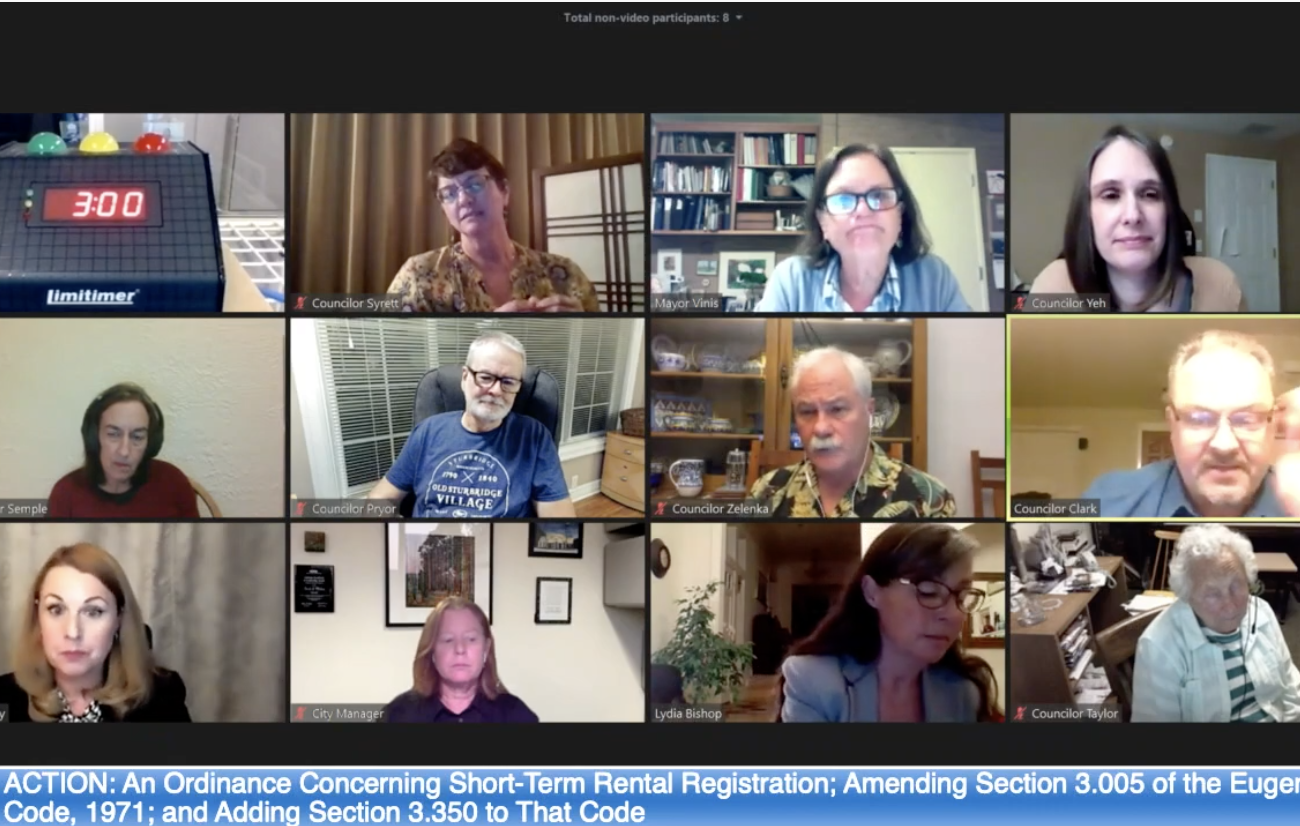The Eugene City Council has been toying with imposing more regulations on short term rentals (STRs) since September 2019, when councilors discussed how these rentals, most commonly hosted through Airbnb, have impacted other cities, and what regulations might curb some of their potential downsides.
At the Sept. 28 City Council meeting, councilors voted to require STR owners to register with the city starting next year, provide a street address for the property, contact information for property management and whether the short-term rental is owner-occupied. This registration will be free.
This comes after multiple public forum sessions where councilors floated more serious regulations, like requiring a business license to operate an Airbnb.
The council voted 6-2 for this registration, with Councilors Betty Taylor and Alan Zelenka saying that they didn’t think this requirement solves any real problems that short-term rentals might be causing.
Airbnbs and affordable housing
Some of the benefits of STRs that councilors discussed at a Sept. 23, 2019, work session were increased tourism and adding jobs to the local economy. On the other hand, STR properties, especially those that are not owner-occupied, might create nuisance problems in otherwise quiet neighborhoods and might also reduce the availability of affordable housing.
Eugene lacks affordable housing, and according to a 2019 city survey, the majority of rental households in Eugene are rent-burdened, with 58 percent of rental households paying more than 30 percent of their income on rent, and 36 percent of rental households paying more than half of their income on rent.
According to data provided by the city at the work session last year, Airbnbs have had an impact on availability of affordable housing in other cities, but while there isn’t sufficient data suggesting that many property owners in Eugene would buy housing just to rent it to short term renters, there is anecdotal evidence that this has been happening.
The impact on property owners
Many people who own and operate STRs, however, have spoken out against imposing regulations on their properties.
At a June 15 public hearing on the issue, STR owners spoke out about the harm that requiring business licenses to operate these rentals would have on their livelihoods. Many of these owners said that the city does not have sufficient data to suggest that these rentals have caused problems in Eugene.
Valerie Harris, an Airbnb host, said that imposing regulations based on neighbor complaints, as was posed by the council, could have discriminatory implications in a mostly white city.
“As an STR host in an affluent, white community, my all-white neighbors display the ugly truth whenever I have guests of color by coming over to my house and berating me and my guests,”Harris said. “This regulation is going to turn into yet one more tool in a white man’s toolbox to keep their privilege. There is no data to support that there are any problems associated with STRs in Eugene.”
Paul Schwartz, who also owns and operates an Airbnb, said that he doesn’t think that the city should be looking at regulations for STR owners now, in the middle of a pandemic that has caused a massive hit on the hospitality industry.
“As with all people and businesses in the hospitality industry, the recent COVID-19 restrictions and concerns have had a major impact on the revenue we received,” Schwartz said. “With so many families suffering financially at this time, it strikes me as a bad time for the city to be considering new registration that would limit that income that may help us make ends meet.”
With the Olympics — and the Eugene-hosted U.S. Olympic Team Track and Field trials — and World Track and Field Championships pushed back a year, the University of Oregon cancelling in-person graduation ceremonies and nobody traveling to watch Duck games, people haven’t been traveling to Eugene as much as usual.
Last October, Airbnb revealed that Eugene was on the list of top 20 worldwide destinations to visit in 2020, with a 213 percent year over year increase. But the STR platform took a big hit due to COVID-19, and while it’s unclear exactly how much Eugene STR owners suffered during the pandemic, they are likely not doing as well as they hoped.
Registration requirement
At a July 13 work session, Lydia Kaye, Building and Permit Services director for the city of Eugene, said the city does not have accurate data about how many STRs are in Eugene, and that they don’t know how many nuisance complaints are regarding STRs as opposed to other types of rentals.
Kaye said that a registration process for short-term rental owners would help the city find more of this data so they could consider future regulations.
Taylor said that STRs have hurt other cities by taking up housing supply that could be used for affordable housing. She said that they shouldn’t wait until short term rentals cause problems to regulate them.
“The time to take care of this is before there are serious problems, not after,” Taylor said.
During the Sept. 28 vote, Taylor voted not to move forward with the registration requirement, because she wanted more serious regulations.
“This doesn’t do anything. We had a start a few months ago when we were brought a possible ordinance about STRs, and that died somehow,” Taylor said. “We have plenty of examples of what has happened in other communities with STRs and how they have destroyed the affordable housing supply. I think this is ridiculous that after all this time, we haven’t really done anything.”
Zelenka dissented as well.
“I don’t think this does anything, it certainly doesn’t solve any of the problems that STRs create,” Zelenka said. “I’m sure this will come back to us, it’s not the end of this issue.”
